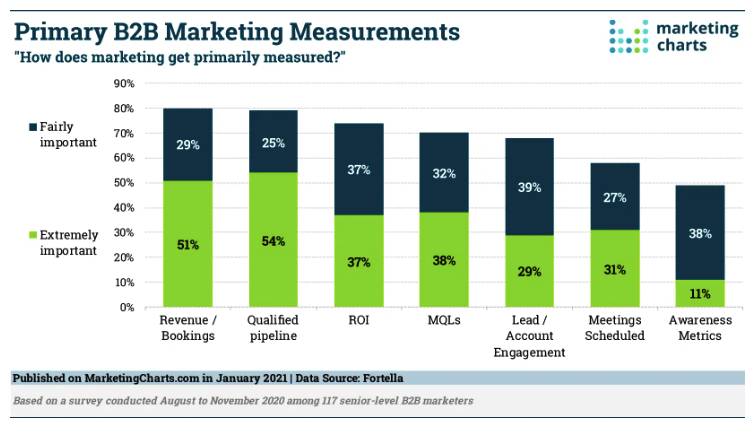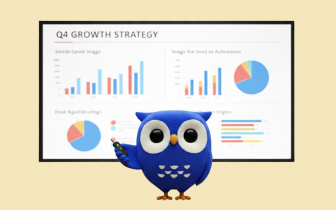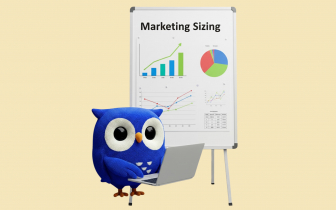B2B Marketing KPIs: What They Are and How to Choose Them

Whenever we need to improve something, we must break it into measurable components and find ways to optimize those. B2B marketing KPIs serve that very purpose.
B2B marketers use KPIs to identify areas of improvement, measure success, and allocate resources effectively. But how exactly do they choose the right KPIs and utilize them to their full potential?
This article introduces you to the world of marketing KPIs for B2B. It explores their specific applications, delving deep into B2B marketing KPI examples related to sales, products, website operation, eCommerce, and lead generation.
What are B2B marketing KPIs?
B2B marketing KPIs (key performance indicators) are measurable values that help marketing practitioners track and evaluate the performance of marketing strategies, tactics, and tools.
In essence, they are objective-oriented B2B marketing metrics, but compared to metrics, KPIs usually focus on a relatively bigger picture. KPIs are directly tied to strategic marketing goals like increasing lead generation, boosting traffic acquisition, and measuring and improving customer engagement, to name a few.
Source: RIB
Why B2B marketing metrics matter
Any B2B marketing measurement would be incomplete and pointless without relevant KPIs that connect it to tangible strategic objectives.
For instance, what's the sense of calculating website visitors (traffic) if we don’t have the means to convert this traffic into qualified leads? A specific KPI called LCR (Lead Conversion Rate) helps us effectively track and convert website traffic into leads.
We live in a hyper B2B performance reality, where every US dollar spent on marketing must count and be justified. The competition is intense, and B2B performance metrics constantly evolve to give marketers new and better ways of driving their businesses forward.
Here are some of the most convincing reasons for B2B marketers to use KPIs:
- Support to the business goals: KPIs ensure your marketing activities, no matter how small and trivial, are aligned with the high-level business objectives. For example, JLL introduced 16 KPIs to track marketing performance, leading to a quadrupling of revenue since 2022.
- Identification of problems: Marketing KPIs help B2B businesses identify and address problems and bottlenecks, and find performance improvement opportunities.
- A sense of purpose: By measuring KPIs, marketing teams and business leaders understand when and how to push the envelope to achieve the desired results. A 2024 survey by Statista found that 64% of marketing decision-makers worldwide track their marketing/sales pipeline as a key performance indicator.
- Predictive power: Tracking KPIs over time enables the accumulation of knowledge and insights on current and future trends, aiding business readiness and adaptability.
Whether you’re contemplating a daring startup or revitalizing a well-established business, the right marketing KPIs B2B will help you gain momentum, outpace your rivals, and achieve long-term growth.

Source: Marketing Insider Group
Key types of B2B marketing KPIs
The B2B KPIs are as diverse as the world ocean’s biological life. Nevertheless, one can distinguish separate seas, straits, and bays that group related “species” of KPIs serving shared purposes, e.g., sales, website, and many other performance indicators.
B2B sales KPIs
The B2B sales metrics or KPIs measure the effectiveness of one’s sales processes. You need to implement sales KPIs whenever you want to improve your sales efficiency, reduce churn rate, identify the top-performing marketing campaigns, and do other things related to sales.
Examples of marketing and sales KPIs in B2B include:
- Lead Conversion Rate (LCR), also commonly referred to as Lead-to-Customer Conversion Rate, is a measure of leads businesses turn into paying customers.
- Customer Acquisition Cost (CAC): The total cost of acquiring a new customer. CAC typically consists of all marketing and sales spent for a customer.
- Churn Rate (CR): A measure of how many customers left your business within a specific period.
- Sales Revenue (SR): A total revenue generated from B2B sales over a specific time frame.
- Customer Lifetime Value (CLV): The overall income a customer is expected to bring to your business over their entire interaction (lifetime) with your brand.
In general, there are hundreds of sales KPIs and their variations, depending on your industry and business niche.
For example, a customer acquisition cost in the e-commerce industry becomes a patient acquisition cost in the healthcare industry. Whereas, a customer retention rate in the finance sector often transforms into a subscriber retention rate for SaaS operators.
B2B website KPIs
Website marketing has its own set of B2B metrics. These KPIs measure everything that happens on your website. For example, how customers interact with various graphical, textual, and navigational elements.
Why are B2B website KPIs important? Because your website is your business's storefront. It’s the main touchpoint and “living space” for your B2B prospects and customers.
The following website KPIs are essential for tracking in B2B:
- Website Traffic: The number of visitors that attend your website, including mobile visitors, over a specific period.
- Unique Website Visitors: Same as the above, but excluding repeat visitors.
- Time on Page: A total amount of time a visitor/user spends on a particular website page.
- Bounce Rate: The percentage of visitors that leave your website upon performing a particular action (e.g., viewing a page).
- Conversion Rate: The percentage of website visitors that perform a desired action (fill in a form, make a purchase, view a video, download a sample/tutorial, etc.).
Virtually every B2B company has gone online now, making website KPIs absolutely necessary for measuring and boosting its marketing performance.
By the way, measuring website KPIs is easier with hi-tech tools and automation solutions like Google Analytics (their GA4 version is cost-free).
Source: Analytico
Lead generation KPIs
The B2B lead generation KPIs are the foundation for any B2B business model. They measure the effectiveness of one’s efforts in capturing and sustaining leads. For example, you’ll need to employ lead generation KPIs when running a marketing campaign to drive traffic to your business.
Without further ado, some of the widely used lead generation KPIs include:
- Cost per Lead (CPL): This is the measure of how much money you spend per lead.
- Number of Qualified Leads: A specific number of leads that qualify for a particular purpose (not all leads are equal, meaning that only a fraction of them can meet your criteria for potential customers).
- Lead Velocity Rate (LVR): How fast you generate leads (qualified leads) over a specific period.
- Landing Page Conversion Rate: The converting performance of your landing page, commonly used in SEO. Usually, Landing Page CR is measured by the number of qualified leads it generates.
- Form Conversion Rate: The percentage of visitors who fill in a specific lead-generating form on your website/landing page.
Which of these KPIs demonstrate engagement, since businesses often need to measure how well users interact with their web pages or specific content? Out of the KPIs mentioned above, the Form Conversion Rate, Lead Velocity Rate, and Landing Page Conversion Rate meet the engagement criteria.
Ecommerce KPIs for B2B businesses
Despite e-commerce being widely associated with the B2C segment, the fast-paced B2B models have lately become common for the e-commerce industry.
Basically, anything that contributes to the efficiency of digital sales channels is worth measuring and tracking, and the B2B e-commerce approaches and solutions are no exception.
Here are the main B2B marketing metrics that matter for e-commerce:
- Average Order Value (AOV): This KPI measures the average amount spent per transaction on one’s e-commerce platform.
- Cart Abandonment Rate: The rate at which B2B customers leave your products and services, so to speak, “not purchased.” They add items to the cart but don’t finish the purchasing procedure.
- Revenue by Channel: Measure the channel-based income for one’s business. Let’s say you sell via social media (e.g., LinkedIn), search advertising, or PPC, and you want to measure revenue generated by each channel.
- Repeat Purchase Rate: The percentage of B2B customers who make repeat purchases from your business.
B2B ecommerce KPIs increasingly gain momentum in the SaaS sector. The so-called SaaSpreneurs, or the new breed of entrepreneurs in the SaaS sector, actively leverage the B2B marketing metrics to drive the performance of their digital startups.
Product-focused KPIs for B2B businesses
Measuring marketing KPIs for B2B sector selling specific products is a relatively new trend. For instance, product-focused KPIs are highly demanded in manufacturing and technology niches.
For companies selling software, especially AI-empowered tools, and applications, product KPIs help to stay competitive and attract new B2B clients. Examples include Claude by Anthropic or their direct rival, ChatGPT by OpenAI.
Some of the widely used B2B product KPIs include:
- Product Adoption Rate: The rate of your product adoption, often measured as a percentage of customers who use your products and services. E.g., ChatGPT has over 300 million weekly users.
- Net Promoter Score (NPS): The measure of how the customers are likely to recommend your product and services to others (non-customers).
- Customer Retention Rate: Measures the percentage (or proportion) of customers willing to stay loyal to your product or service.
- Return on Product Investment (ROPI): Benchmarks the revenue generated compared to the costs involved in the production and marketing.
If you are not tracking product KPIs for your B2B yet, consider doing so now, or else the competition will leave you far behind.
Source: TUC
How to choose the right B2B marketing KPIs
With so many B2B marketing KPIs you may feel lost and unable to wrap your mind around this topic. Don’t despair; you are not alone in this weird digital world, and we are here to help you put everything in order.
Here is a simple algorithm of actions to help you choose the right KPIs for your business:
- Set your goals. Start by defining your marketing goals, such as boosting brand awareness, driving traffic, generating leads, or increasing sales. Each set of goals will require particular KPIs to track their progress and improve performance, e.g., b2b sales KPIs for your sales-related goals.
- Understand your audience. As with any business undertaking, knowing your target audience is the key to success. Take your time to learn about their pain points, the most urgent needs, behavior patterns, and demographics. Then, select the appropriate KPIs to address your audience’s portrait.
- Leverage tools and technologies. Use tools like Marketo or Hubspot to implement, analyze, and automate your KPIs with ease and precision.
- Finally, use SMART criteria. SMART, in connection to the marketing leading indicators, stands for Specific, Measurable, Achievable, Relevant, and Time-bound, meaning your KPIs should meet these criteria.
You’ll have a massive advantage if you already have one or several of the above activities done by your marketing team. They’ll become your low-hanging fruits to immediately position you ahead of your rivals.
Source: Asana
Conclusion
Can B2B marketing live without KPIs as a performance measurement? Probably, yes. But will it be better off? Certainly not.
For what it's worth, B2B marketing metrics should be in the arsenal of performance-enhancing tools of every successful B2B entrepreneur. These metrics help to stay competitive and to keep track of one’s business health at any given moment.
Moreover, choosing the optimal KPIs should be a part of every strategy and business planning session. A bit of early practice with SMART goals will pave the way for fast, impactful results.
All trademarks, logos, images, and materials are the property of their respective rights holders.
They are used solely for informational, analytical, and review purposes in accordance with applicable copyright law.







